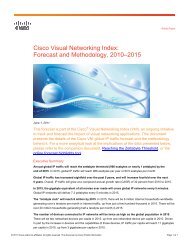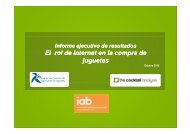Open Innovation 2.0 Yearbook 2013 - European Commission - Europa
Open Innovation 2.0 Yearbook 2013 - European Commission - Europa
Open Innovation 2.0 Yearbook 2013 - European Commission - Europa
You also want an ePaper? Increase the reach of your titles
YUMPU automatically turns print PDFs into web optimized ePapers that Google loves.
90 O P E N I N N O V A T I O N 2 0 1 3<br />
Ramps to escape the resistance to change<br />
How does a pioneering innovation region develop<br />
the momentum to accelerate innovation and<br />
escape the gravity of resistance to change and<br />
reluctance to act? The simple answer is that<br />
regions can do this in the same way pioneers do:<br />
by hard work, using relevant resources, appropriate<br />
skills, and proven practice, and engaging broad<br />
segments of the population to make the journey<br />
together. This means investing in practice. Pioneering<br />
regions work with methodologies of change<br />
to engage people, define shared purpose, create<br />
conditions for good collaboration, build capacity,<br />
showcase examples, and show the way forward.<br />
This section of our paper indicates how some of<br />
this proven practice can be directly applied to help<br />
pioneering innovation regions ramp up to leverage<br />
research excellence, industrial leadership and<br />
the power of people to create social and societal<br />
innovations.<br />
Launching new initiatives is a necessary part of<br />
societal innovation and, in many cases, acceleration<br />
is needed to escape the gravity of forces holding<br />
innovation back — the resistance to change,<br />
the reluctance to act, the fear of failure, the uncertainty<br />
of risks. Ramps are one of our oldest ‘technologies’<br />
for reducing friction, and they can be useful<br />
tools to overcome the resistance of gravity. The<br />
New Club of Paris encourages creating ‘ramps’ for<br />
societal innovation.<br />
The New Club of Paris (NCP) is a global network<br />
organisation working as an agenda developer for<br />
knowledge societies. Established in 2006, its goal<br />
is to help countries, regions and organisations make<br />
the transition to a knowledge society. The NCP does<br />
not provide answers, but develops frameworks<br />
for asking powerful questions. Clear metrics and<br />
cutting-edge research are part of their arsenal of<br />
instruments, and its members have extensive experience<br />
with using intellectual capital instruments.<br />
Building on this experience, and based on lessons<br />
garnered from many decades of members’ practice,<br />
the NCP has been successful in developing effective<br />
instruments for innovation in knowledge societies,<br />
using research and metrics to support processes<br />
of engagement, participation and change. To<br />
address the challenges of accelerating innovation<br />
in pioneering regions, the NCP proposes a focus on<br />
practical actions, applying existing knowledge and<br />
change methodologies in supporting regions to<br />
address actual and pressing issues. They suggest<br />
that regions can create ramps for societal innovation,<br />
using co-creation principles to prototype processes<br />
that can already provide societal outcomes<br />
even as they develop. Diverse change technologies<br />
are available for the ramp, focusing on practical<br />
actions such as:<br />
• engaging key players in the ecosystem;<br />
• creating awareness, interest and conditions to<br />
‘go beyond’;<br />
• enabling deeper understanding of issues,<br />
broader societal contexts, opportunities and<br />
possible consequence of choices;<br />
• closing the gap between talking, thinking and<br />
theory by probing, prototyping and practice;<br />
• creating fast cycles of prototypes for rapid<br />
realisation.<br />
Specifically, a region would be able to work towards<br />
developing a culture of innovativeness driven by<br />
entrepreneurial spirit, thus creating conditions for<br />
key entrepreneurial processes such as exploring,<br />
discovering, and pioneering to succeed. Within this<br />
culture, the engagement of stakeholders in participatory<br />
processes is central. This could be accomplished<br />
in a prototyping context, accelerating the<br />
process of engaging stakeholders and citizens,<br />
taking advantage of existing investment choices,<br />
reducing political risk and industrial lock-in, and<br />
speeding up the learning process. The movement<br />
from intent to implementation can be conceptualised<br />
as a possible 1-year work process to take<br />
intent to implementation (Table 2). In this process,<br />
the ramp is both a conceptual — but also a physical<br />
and virtual — location where both work place and<br />
work process facilitate people to focus on the nuts<br />
and bolts of concrete experimenting [8].
















